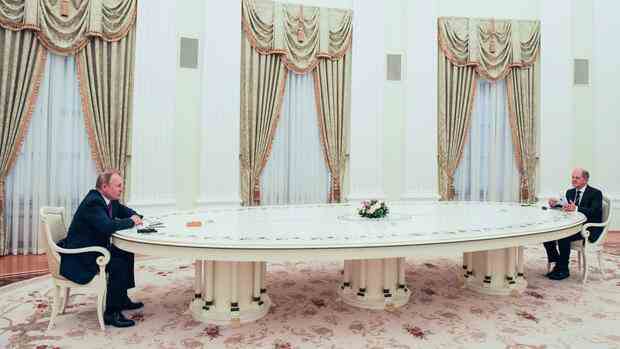A distance that could hardly be greater today: Germany is not in a military war with Russia, but the authors speak of an economic war.
(Photo: imago images/ITAR-TASS)
Dusseldorf Germany is in the middle of a war. A phrase that needs to be handled with care. Of course, this does not mean a war with guns and soldiers, after all the western partners in the Ukraine war do their best to avoid coming close to being a war party. And yet he’s right.
Not only Germany is in a war, more precisely in an economic war, but also all other EU countries, the USA, Great Britain, Norway, Canada. In short: all states that have joined the numerous sanctions against Russia, the country’s economy and especially the power elite.
The economic ethicist Nils Ole Oermann and Hans-Jürgen Wolff, lawyer and former head of the Office of the Federal President, also come to the same conclusion. Your book “Wirtschaftskriege”, an updated version of which has just been published, accurately depicts the history of economic disputes between states. Above all, however, they urge more accuracy: not every dispute over imports and exports is well described with “economic war”.
However, the term fits exactly to the mutual sanctions imposed by Russia and Ukraine supporters. The authors even state that there has never been an economic war on this scale without mutual use of arms. Even the Cold War lags behind, as world trade was far less intertwined then than it is today. Never before have countries developed such detailed sanctions packages as they are currently doing.
Sanctions, Oermann and Wolff note, are not without controversy in retrospect. Political scientists and economists find it difficult to clearly assess effectiveness and accuracy, as the context and course of individual economic wars are too different.
Sanctions can work, but there is no panacea
But the authors state what sanctions should be measured against: Do they work? To whom and how strong? And: do the goals and actual consequences of sanctions match?
Many historical examples demonstrate the effectiveness of sanctions. The end of apartheid in South Africa, for example, Iran’s nuclear program, which was temporarily slowed down, or the Gaddafi regime in Libya, which renounced weapons of mass destruction. However, a general rule cannot be derived from this. “There is no magic formula,” the authors conclude.

Nils Ole Oermann, Hans-Jürgen Wolff: Economic wars
Publisher Herder
Freiburg im Breisgau 2023
400 pages
26 euros
Maurice Höfgen, who has become a kind of economics influencer in recent months, is also examining the consequences of the sanctions policy against Russia. In his book “The New Economic War,” the left-wing young economist, who used to work for the economic politician Fabio De Masi in the Bundestag, states: Not all punitive measures against the Putin regime were by any means accurate.
It may be a bit too early to make a final assessment of the sanctions, but Höfgen is already taking stock of the situation. The book seems like a collection of his tweets in long form, with tabloid-like language, love for detailed explanations and joy in clear judgment.

Maurice Höfgen: The new economic war
Brumaire Publishers
Berlin 2022
276 pages
15 euro
He harshly criticizes the attempts to control the billions of Russian oligarchs. The super-rich would be important Putin whisperers if they really saw their fortunes, which they often acquired in at least dubious ways, in real danger. But the loopholes for them are more of an invitation and leave plenty of scope to disguise, transfer or even get out of the country.
Sanctions against oligarchs are actually a means of economic warfare that do not involve major collateral damage. It hits who it’s supposed to hit – or not, as is often the case in the economic war against Russia.
Economic warfare is ‘the best option available’
Höfgen also wants to dispel the myth that the ruble’s exchange rate reflects the effectiveness of Western sanctions. Although the ruble fell rapidly after the start of the war, the Russian currency is now trading at about the average value of the pre-war years.
Moscow only stabilized the ruble with massive capital controls and the trick of having energy supplies paid for in rubles. Nothing has yet been said about the state of the Russian economy.
There are many indications that export bans will hit Russia hard. For months, high-tech industries and aviation have been working in improvised operations because parallel imports from third countries are far from being able to replace everything. Oermann and Wolff also argue that the trade bans will primarily affect Russia’s economy in the long term and set decades back in development.
>> Read also: The collapse of Russia’s economy is imminent
The authors agree that the sanctions are also costing Western countries a lot of money. Above all, Höfgen denounces the handling of the energy price crisis. In his view, gas price caps and tax breaks should have helped more quickly and comprehensively.
Poor households in particular, which already spend a large part of their money on energy, suffered from the price jumps. Nevertheless, Oermann and Wolff are certain: the economic war against Russia is “the best available option”.
More: The Circle of Power – These men are Putin’s closest associates
